- Home
- Brandon Sanderson
The Mistborn Trilogy Page 2
The Mistborn Trilogy Read online
Page 2
More than one person perked up at the comment. This was the real reason they tolerated him—the reason even the timid peasants would harbor a man such as Kelsier, a skaa who defied the Lord Ruler’s will by traveling from plantation to plantation. A renegade he might be—a danger to the entire community—but he brought news from the outside world.
“I come from the north,” Kelsier said. “From lands where the Lord Ruler’s touch is less noticeable.” He spoke in a clear voice, and people leaned unconsciously toward him as they worked. On the next day, Kelsier’s words would be repeated to the several hundred people who lived in other hovels. The skaa might be subservient, but they were incurable gossips.
“Local lords rule in the West,” Kelsier said, “and they are far from the iron grip of the Lord Ruler and his obligators. Some of these distant noblemen are finding that happy skaa make better workers than mistreated skaa. One man, Lord Renoux, has even ordered his taskmasters to stop unauthorized beatings. There are whispers that he’s considering paying wages to his plantation skaa, like city craftsmen might earn.”
“Nonsense,” Tepper said.
“My apologies,” Kelsier said. “I didn’t realize that Goodman Tepper had been to Lord Renoux’s estates recently. When you dined with him last, did he tell you something that he did not tell me?”
Tepper blushed: Skaa did not travel, and they certainly didn’t dine with lords. “You think me a fool, traveler,” Tepper said, “but I know what you’re doing. You’re the one they call the Survivor; those scars on your arms give you away. You’re a troublemaker—you travel the plantations, stirring up discontent. You eat our food, telling your grand stories and your lies, then you disappear and leave people like me to deal with the false hopes you give our children.”
Kelsier raised an eyebrow. “Now, now, Goodman Tepper,” he said. “Your worries are completely unfounded. Why, I have no intention of eating your food. I brought my own.” With that, Kelsier reached over and tossed his pack onto the earth before Tepper’s table. The loose bag slumped to the side, dumping an array of foods to the ground. Fine breads, fruits, and even a few thick, cured sausages bounced free.
A summerfruit rolled across the packed earthen floor and bumped lightly against Tepper’s foot. The middle-aged skaa regarded the fruit with stunned eyes. “That’s nobleman’s food!”
Kelsier snorted. “Barely. You know, for a man of renowned prestige and rank, your Lord Tresting has remarkably poor taste. His pantry is an embarrassment to his noble station.”
Tepper paled even further. “That’s where you went this afternoon,” he whispered. “You went to the manor. You…stole from the master!”
“Indeed,” Kelsier said. “And, might I add that while your lord’s taste in food is deplorable, his eye for soldiers is far more impressive. Sneaking into his manor during the day was quite a challenge.”
Tepper was still staring at the bag of food. “If the taskmasters find this here…”
“Well, I suggest you make it disappear then,” Kelsier said. “I’d be willing to bet that it tastes a fair bit better than watered-down farlet soup.”
Two dozen sets of hungry eyes studied the food. If Tepper intended further arguments, he didn’t make them quickly enough, for his silent pause was taken as agreement. Within a few minutes, the bag’s contents had been inspected and distributed, and the pot of soup sat bubbling and ignored as the skaa feasted on a meal far more exotic.
Kelsier settled back, leaning against the hovel’s wooden wall and watching the people devour their food. He had spoken correctly: The pantry’s offerings had been depressingly mundane. However, this was a people who had been fed on nothing but soup and gruel since they were children. To them, breads and fruits were rare delicacies—usually eaten only as aging discards brought down by the house servants.
“Your storytelling was cut short, young man,” an elderly skaa noted, hobbling over to sit on a stool beside Kelsier.
“Oh, I suspect there will be time for more later,” Kelsier said. “Once all evidence of my thievery has been properly devoured. Don’t you want any of it?”
“No need,” the old man said. “The last time I tried lords’ food, I had stomach pains for three days. New tastes are like new ideas, young man—the older you get, the more difficult they are for you to stomach.”
Kelsier paused. The old man was hardly an imposing sight. His leathered skin and bald scalp made him look more frail than they did wise. Yet, he had to be stronger than he looked; few plantation skaa lived to such ages. Many lords didn’t allow the elderly to remain home from daily work, and the frequent beatings that made up a skaa’s life took a terrible toll on the elderly.
“What was your name again?” Kelsier asked.
“Mennis.”
Kelsier glanced back at Tepper. “So, Goodman Mennis, tell me something. Why do you let him lead?”
Mennis shrugged. “When you get to be my age, you have to be very careful where you waste your energy. Some battles just aren’t worth fighting.” There was an implication in Mennis’s eyes; he was referring to things greater than his own struggle with Tepper.
“You’re satisfied with this, then?” Kelsier asked, nodding toward the hovel and its half-starved, overworked occupants. “You’re content with a life full of beatings and endless drudgery?”
“At least it’s a life,” Mennis said. “I know what wages malcontent and rebellion bring. The eye of the Lord Ruler, and the ire of the Steel Ministry, can be far more terrible than a few whippings. Men like you preach change, but I wonder. Is this a battle we can really fight?”
“You’re fighting it already, Goodman Mennis. You’re just losing horribly.” Kelsier shrugged. “But, what do I know? I’m just a traveling miscreant, here to eat your food and impress your youths.”
Mennis shook his head. “You jest, but Tepper might have been right. I fear your visit will bring us grief.”
Kelsier smiled. “That’s why I didn’t contradict him—at least, not on the troublemaker point.” He paused, then smiled more deeply. “In fact, I’d say calling me a troublemaker is probably the only accurate thing Tepper has said since I got here.”
“How do you do that?” Mennis asked, frowning.
“What?”
“Smile so much.”
“Oh, I’m just a happy person.”
Mennis glanced down at Kelsier’s hands. “You know, I’ve only seen scars like those on one other person—and he was dead. His body was returned to Lord Tresting as proof that his punishment had been carried out.” Mennis looked up at Kelsier. “He’d been caught speaking of rebellion. Tresting sent him to the Pits of Hathsin, where he was worked until he died. The lad lasted less than a month.”
Kelsier glanced down at his hands and forearms. They still burned sometimes, though he was certain the pain was only in his mind. He looked up at Mennis and smiled. “You ask why I smile, Goodman Mennis? Well, the Lord Ruler thinks he has claimed laughter and joy for himself. I’m disinclined to let him do so. This is one battle that doesn’t take very much effort to fight.”
Mennis stared at Kelsier, and for a moment Kelsier thought the old man might smile in return. However, Mennis eventually just shook his head. “I don’t know. I just don’t—”
The scream cut him off. It came from outside, perhaps to the north, though the mists distorted sounds. The people in the hovel fell silent, listening to the faint, high-pitched yells. Despite the distance and the mist, Kelsier could hear the pain contained in those screams.
Kelsier burned tin.
It was simple for him now, after years of practice. The tin sat with other Allomantic metals within his stomach, swallowed earlier, waiting for him to draw upon them. He reached inside with his mind and touched the tin, tapping powers he still barely understood. The tin flared to life within him, burning his stomach like the sensation of a hot drink swallowed too quickly.
Allomantic power surged through his body, enhancing his senses. The room around him became
crisp, the dull firepit flaring to near blinding brightness. He could feel the grain in the wood of the stool beneath him. He could still taste the remnants of the loaf of bread he’d snacked on earlier. Most importantly, he could hear the screams with supernatural ears. Two separate people were yelling. One was an older woman, the other a younger woman—perhaps a child. The younger screams were getting farther and farther away.
“Poor Jess,” a nearby woman said, her voice booming in Kelsier’s enhanced ears. “That child of hers was a curse. It’s better for skaa not to have pretty daughters.”
Tepper nodded. “Lord Tresting was sure to send for the girl sooner or later. We all knew it. Jess knew it.”
“Still a shame, though,” another man said.
The screams continued in the distance. Burning tin, Kelsier was able to judge the direction accurately. Her voice was moving toward the lord’s manor. The sounds set something off within him, and he felt his face flush with anger.
Kelsier turned. “Does Lord Tresting ever return the girls after he’s finished with them?”
Old Mennis shook his head. “Lord Tresting is a law-abiding nobleman—he has the girls killed after a few weeks. He doesn’t want to catch the eye of the Inquisitors.”
That was the Lord Ruler’s command. He couldn’t afford to have half-breed children running around—children who might possess powers that skaa weren’t even supposed to know existed….
The screams waned, but Kelsier’s anger only built. The yells reminded him of other screams. A woman’s screams from the past. He stood abruptly, stool toppling to the ground behind him.
“Careful, lad,” Mennis said apprehensively. “Remember what I said about wasting energy. You’ll never raise that rebellion of yours if you get yourself killed tonight.”
Kelsier glanced toward the old man. Then, through the screams and the pain, he forced himself to smile. “I’m not here to lead a rebellion among you, Goodman Mennis. I just want to stir up a little trouble.”
“What good could that do?”
Kelsier’s smile deepened. “New days are coming. Survive a little longer, and you just might see great happenings in the Final Empire. I bid you all thanks for your hospitality.”
With that, he pulled open the door and strode out into the mist.
Mennis lay awake in the early hours of morning. It seemed that the older he became, the more difficult it was for him to sleep. This was particularly true when he was troubled about something, such as the traveler’s failure to return to the hovel.
Mennis hoped that Kelsier had come to his senses and decided to move on. However, that prospect seemed unlikely; Mennis had seen the fire in Kelsier’s eyes. It seemed such a shame that a man who had survived the Pits would instead find death here, on a random plantation, trying to protect a girl everyone else had given up for dead.
How would Lord Tresting react? He was said to be particularly harsh with anyone who interrupted his nighttime enjoyments. If Kelsier had managed to disturb the master’s pleasures, Tresting might easily decide to punish the rest of his skaa by association.
Eventually, the other skaa began to awake. Mennis lay on the hard earth—bones aching, back complaining, muscles exhausted—trying to decide if it was worth rising. Each day, he nearly gave up. Each day, it was a little harder. One day, he would just stay in the hovel, waiting until the taskmasters came to kill those who were too sick or too elderly to work.
But not today. He could see too much fear in the eyes of the skaa—they knew that Kelsier’s nighttime activities would bring trouble. They needed Mennis; they looked to him. He needed to get up.
And so, he did. Once he started moving, the pains of age decreased slightly, and he was able to shuffle out of the hovel toward the fields, leaning on a younger man for support.
It was then that he caught a scent in the air. “What’s that?” he asked. “Do you smell smoke?”
Shum—the lad upon whom Mennis leaned—paused. The last remnants of the night’s mist had burned away, and the red sun was rising behind the sky’s usual haze of blackish clouds.
“I always smell smoke, lately,” Shum said. “The Ashmounts are violent this year.”
“No,” Mennis said, feeling increasingly apprehensive. “This is different.” He turned to the north, toward where a group of skaa were gathering. He let go of Shum, shuffling toward the group, feet kicking up dust and ash as he moved.
At the center of the group of people, he found Jess. Her daughter, the one they all assumed had been taken by Lord Tresting, stood beside her. The young girl’s eyes were red from lack of sleep, but she appeared unharmed.
“She came back not long after they took her,” the woman was explaining. “She came and pounded on the door, crying in the mist. Flen was sure it was just a mistwraith impersonating her, but I had to let her in! I don’t care what he says, I’m not giving her up. I brought her out in the sunlight, and she didn’t disappear. That proves she’s not a mistwraith!”
Mennis stumbled back from the growing crowd. Did none of them see it? No taskmasters came to break up the group. No soldiers came to make the morning population counts. Something was very wrong. Mennis continued to the north, moving frantically toward the manor house.
By the time he arrived, others had noticed the twisting line of smoke that was just barely visible in the morning light. Mennis wasn’t the first to arrive at the edge of the short hilltop plateau, but the group made way for him when he did.
The manor house was gone. Only a blackened, smoldering scar remained.
“By the Lord Ruler!” Mennis whispered. “What happened here?”
“He killed them all.”
Mennis turned. The speaker was Jess’s girl. She stood looking down at the fallen house, a satisfied expression on her youthful face.
“They were dead when he brought me out,” she said. “All of them—the soldiers, the taskmasters, the lords…dead. Even Lord Tresting and his obligators. The master had left me, going to investigate when the noises began. On the way out, I saw him lying in his own blood, stab wounds in his chest. The man who saved me threw a torch in the building as we left.”
“This man,” Mennis said. “He had scars on his hands and arms, reaching past the elbows?”
The girl nodded silently.
“What kind of demon was that man?” one of the skaa muttered uncomfortably.
“Mistwraith,” another whispered, apparently forgetting that Kelsier had gone out during the day.
But he did go out into the mist, Mennis thought. And, how did he accomplish a feat like this…? Lord Tresting kept over two dozen soldiers! Did Kelsier have a hidden band of rebels, perhaps?
Kelsier’s words from the night before sounded in his ears. New days are coming….
“But, what of us?” Tepper asked, terrified. “What will happen when the Lord Ruler hears this? He’ll think that we did it! He’ll send us to the Pits, or maybe just send his koloss to slaughter us outright! Why would that troublemaker do something like this? Doesn’t he understand the damage he’s done?”
“He understands,” Mennis said. “He warned us, Tepper. He came to stir up trouble.”
“But, why?”
“Because he knew we’d never rebel on our own, so he gave us no choice.”
Tepper paled.
Lord Ruler, Mennis thought. I can’t do this. I can barely get up in the mornings—I can’t save this people.
But what other choice was there?
Mennis turned. “Gather the people, Tepper. We must flee before word of this disaster reaches the Lord Ruler.”
“Where will we go?”
“The caves to the east,” Mennis said. “Travelers say there are rebel skaa hiding in them. Perhaps they’ll take us in.”
Tepper paled further. “But…we’d have to travel for days. Spend nights in the mist.”
“We can do that,” Mennis said, “or we can stay here and die.”
Tepper stood frozen for a moment, and Mennis thought the
shock of it all might have overwhelmed him. Eventually, however, the younger man scurried off to gather the others, as commanded.
Mennis sighed, looking up toward the trailing line of smoke, cursing the man Kelsier quietly in his mind.
New days indeed.
PART ONE
THE SURVIVOR OF HATHSIN
I consider myself to be a man of principle. But, what man does not? Even the cutthroat, I have noticed, considers his actions “moral” after a fashion.
Perhaps another person, reading of my life, would name me a religious tyrant. He could call me arrogant. What is to make that man’s opinion any less valid than my own?
I guess it all comes down to one fact: In the end, I’m the one with the armies.
1
ASH FELL FROM THE SKY.
Vin watched the downy flakes drift through the air. Leisurely. Careless. Free. The puffs of soot fell like black snowflakes, descending upon the dark city of Luthadel. They drifted in corners, blowing in the breeze and curling in tiny whirlwinds over the cobblestones. They seemed so uncaring. What would that be like?
Vin sat quietly in one of the crew’s watch-holes—a hidden alcove built into the bricks on the side of the safe house. From within it, a crewmember could watch the street for signs of danger. Vin wasn’t on duty; the watch-hole was simply one of the few places where she could find solitude.
And Vin liked solitude. When you’re alone, no one can betray you. Reen’s words. Her brother had taught her so many things, then had reinforced them by doing what he’d always promised he would—by betraying her himself. It’s the only way you’ll learn. Anyone will betray you, Vin. Anyone.
The ash continued to fall. Sometimes, Vin imagined she was like the ash, or the wind, or the mist itself. A thing without thought, capable of simply being, not thinking, caring, or hurting. Then she could be…free.
She heard shuffling a short distance away, then the trapdoor at the back of the small chamber snapped open.

 Steelheart
Steelheart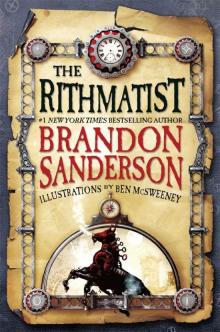 The Rithmatist
The Rithmatist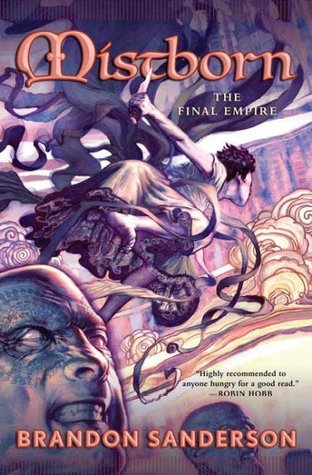 Mistborn: The Final Empire
Mistborn: The Final Empire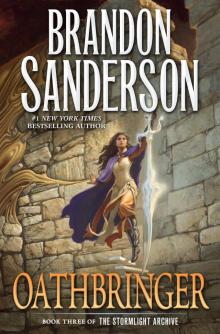 Oathbringer
Oathbringer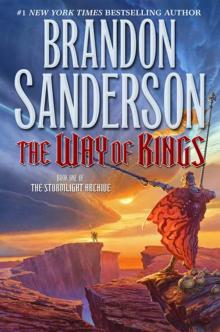 The Way of Kings
The Way of Kings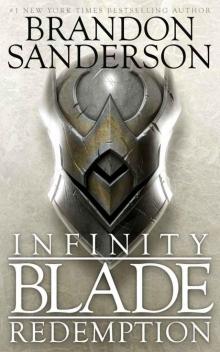 Redemption
Redemption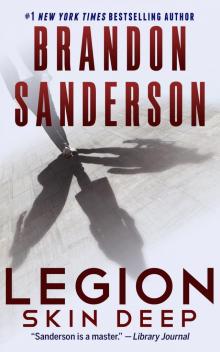 Skin Deep
Skin Deep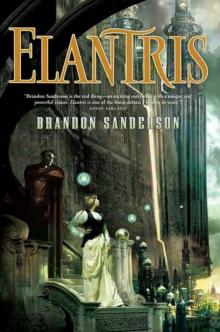 Elantris
Elantris Snapshot
Snapshot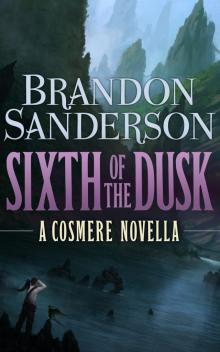 Sixth of the Dusk (Cosmere)
Sixth of the Dusk (Cosmere)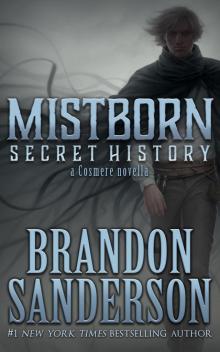 Mistborn: Secret History
Mistborn: Secret History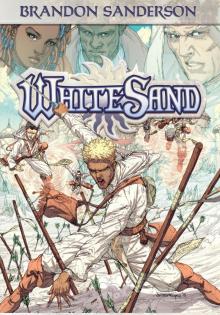 White Sand, Volume 1
White Sand, Volume 1 Legion
Legion The Well of Ascension
The Well of Ascension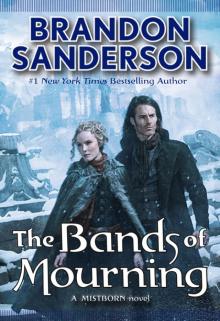 The Bands of Mourning
The Bands of Mourning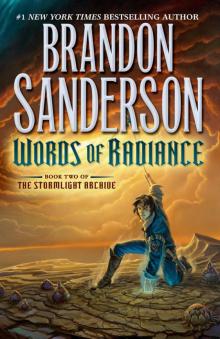 Words of Radiance
Words of Radiance The Hero of Ages
The Hero of Ages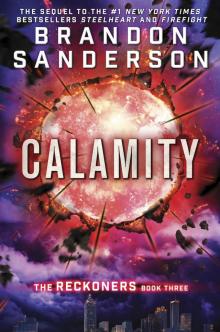 Calamity
Calamity Alcatraz Versus the Scrivener's Bones
Alcatraz Versus the Scrivener's Bones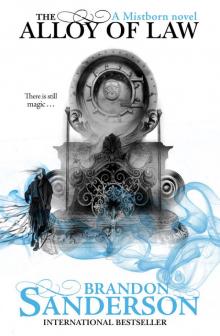 The Alloy of Law
The Alloy of Law The Emperors Soul
The Emperors Soul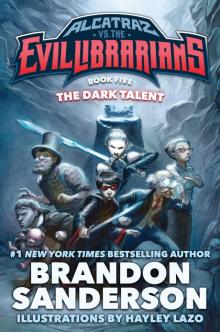 The Dark Talent
The Dark Talent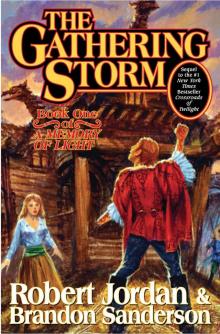 The Gathering Storm
The Gathering Storm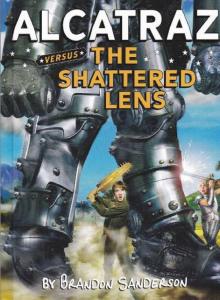 Alcatraz Versus the Shattered Lens
Alcatraz Versus the Shattered Lens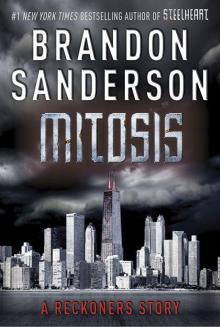 Mitosis
Mitosis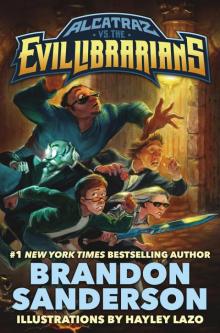 Alcatraz vs. The Evil Librarians
Alcatraz vs. The Evil Librarians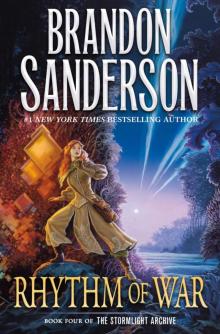 Rhythm of War (9781429952040)
Rhythm of War (9781429952040)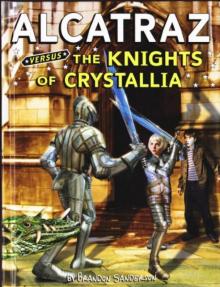 Alcatraz Versus the Knights of Crystallia
Alcatraz Versus the Knights of Crystallia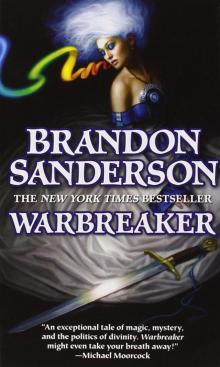 Warbreaker
Warbreaker Firstborn
Firstborn Starsight
Starsight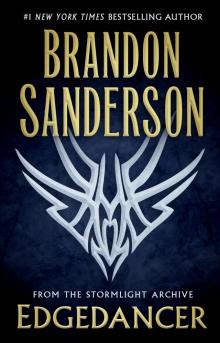 Edgedancer
Edgedancer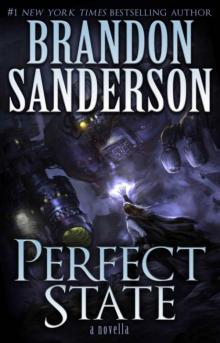 Perfect State
Perfect State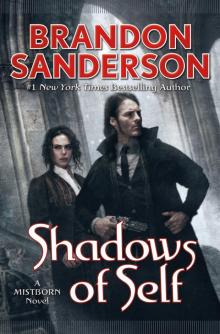 Shadows of Self
Shadows of Self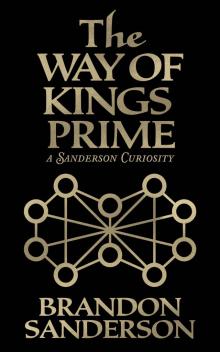 The Way of Kings Prime
The Way of Kings Prime Starsight (US)
Starsight (US)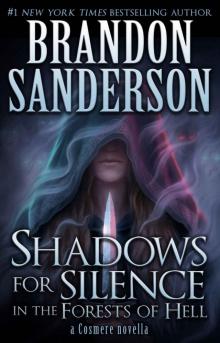 Shadows for Silence in the Forests of Hell
Shadows for Silence in the Forests of Hell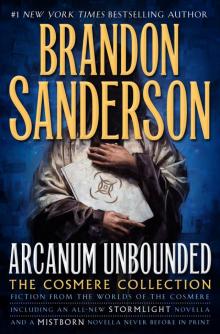 Arcanum Unbounded: The Cosmere Collection
Arcanum Unbounded: The Cosmere Collection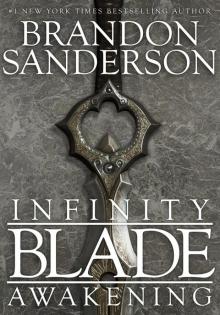 Awakening
Awakening Firefight
Firefight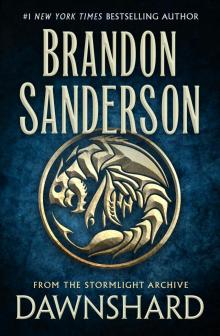 Dawnshard
Dawnshard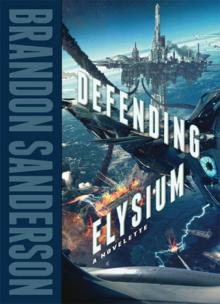 Defending Elysium
Defending Elysium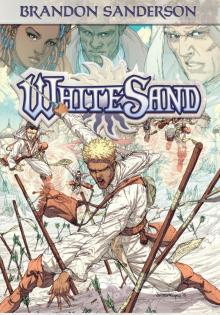 White Sand
White Sand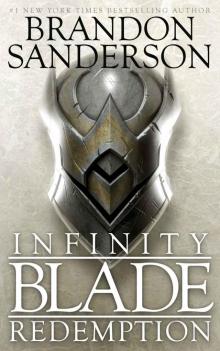 Infinity Blade: Redemption
Infinity Blade: Redemption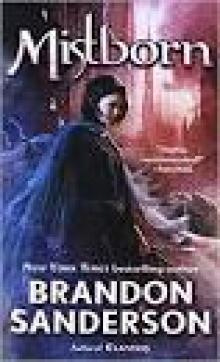 The Final Empire
The Final Empire Skyward
Skyward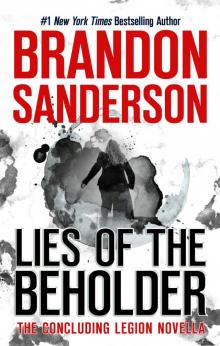 Lies of the Beholder
Lies of the Beholder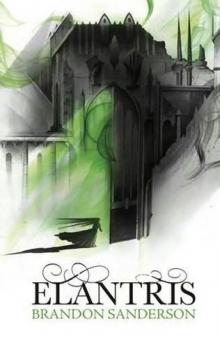 Elantris e-1
Elantris e-1 Steelheart r-1
Steelheart r-1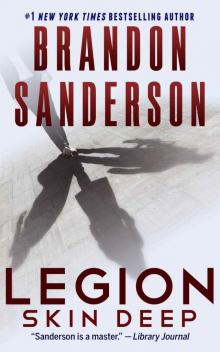 Legion: Skin Deep
Legion: Skin Deep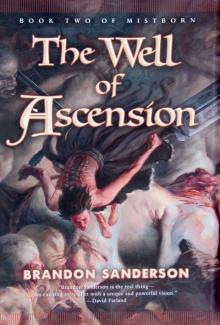 Well of Ascension
Well of Ascension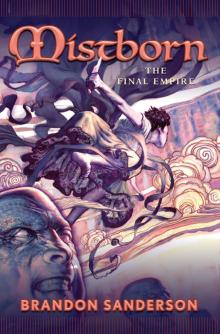 Mistborn
Mistborn Alcatraz versus the Evil Librarians
Alcatraz versus the Evil Librarians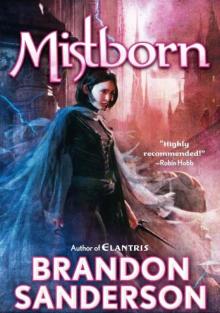 The Final Empire m-1
The Final Empire m-1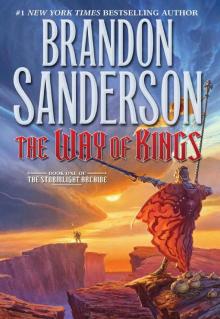 The Way of Kings (Stormlight Archive, The)
The Way of Kings (Stormlight Archive, The)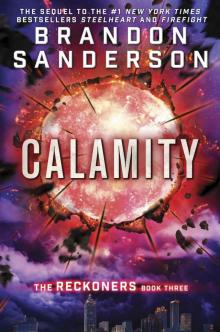 Calamity (The Reckoners)
Calamity (The Reckoners)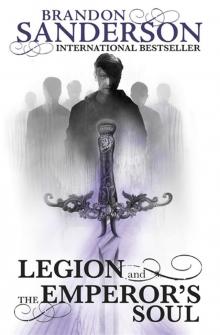 Legion and the Emperor's Soul
Legion and the Emperor's Soul Legion: The Many Lives of Stephen Leeds
Legion: The Many Lives of Stephen Leeds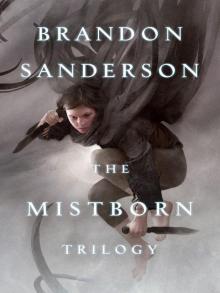 The Mistborn Trilogy
The Mistborn Trilogy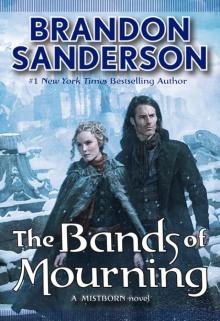 Bands of Mourning
Bands of Mourning Alcatraz
Alcatraz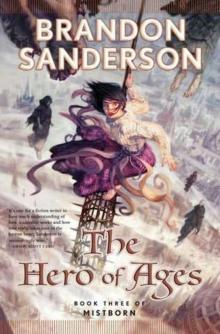 The Hero of Ages m-3
The Hero of Ages m-3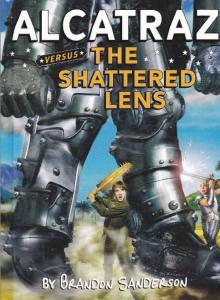 Alcatraz vs. the Shattered Lens
Alcatraz vs. the Shattered Lens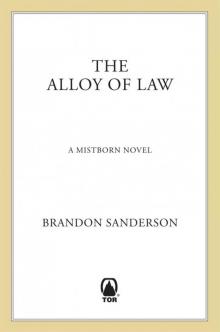 The Alloy of Law: A Mistborn Novel
The Alloy of Law: A Mistborn Novel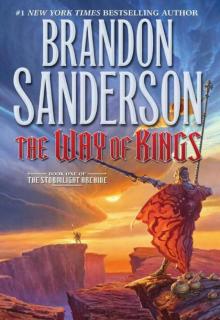 The Way of Kings sa-1
The Way of Kings sa-1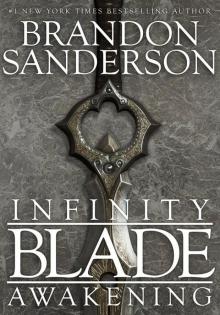 Infinity Blade: Awakening
Infinity Blade: Awakening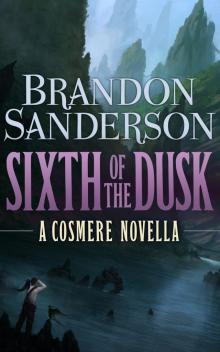 Sixth of the Dusk
Sixth of the Dusk The Stormlight Archive
The Stormlight Archive The Aether of Night
The Aether of Night